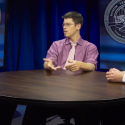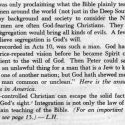Author: Fred Sanders
-
John Webster, 1955-2016: “There is Nothing that the Gospel Does Not Explicate”
Some of us will now have to break the habit of calling John Webster the greatest living theologian. In due course we’ll have to find a way to estimate where he ranks, and how well he fits in, among the great list of teachers who have doctored the church. In the front of my copy…
-

Friends with Aristotle and Each Other
Here’s an episode of The Common Room, the periodic vidcast of the Torrey Honors Institute, made possible by OpenBiola. What we try to capture and share in Common Room conversations is a little bit of the ongoing dialogue that makes up the daily life of Torrey. Usually we do that by gathering a few tutors…
-
Why Say Dogmatics?
It seems to me that a couple of decades ago, you rarely heard the word “dogmatics” used in polite company. “Systematic Theology” had more or less taken over the usage field. You might hear this sort of statement: “You know my favorite systematic theology? Barth’s Dogmatics is my favorite systematic theology.” But you wouldn’t hear,…
-
Biblical Grounding for the Christology of the Councils
I have a brief article in the Criswell Theological Review‘s Fall 2015 theme issue on christology. The article is “Biblical Grounding for the Christology of the Councils,” CTR 13/1 (Fall 2015) 93-104. The main thing I argue in the article is that the most effective way to teach systematic christology is to follow the conceptual structure…
-
Amorites and Exile
This week I got to discuss 1 and 2 Kings with Torrey students. Our sessions were full of surprises (at least for me), and I’m just going to jot down a couple of things I noticed in the course of our conversations. Manasseh was a bad king. After the split into northern and southern kingdoms,…
-
Universal Fatherhood of God: No! and Yes…
There’s a 5-page essay on “The Fatherhood of God” in the 1952 book The Faith: A Symposium of Bible Doctrine. The book, though it never clearly says so, is a collection of essays by Plymouth Brethren writers, and includes among its 25 chapters nice work by F.F. Bruce and W.E. Vine. The essay on the…
-
UnTrinitarian Discouragement (Sibbes)
Richard Sibbes’ (1577–1635) book The Bruised Reed is an extended meditation on discouragement. Sibbes has penetrating insight into how grace and disgrace are always mingled in the life of the Christian. Following his wise counsel can deliver you from unrealistic optimism on the one hand and hopelessness on the other. The “bruised reed” in the…
-

Black Lives Matter at Biola, 1957
I recently learned that the Bible Institute of Los Angeles, through its monthly magazine The King’s Business, took a stand against racial segregation in 1957. This 1957 broadcasting of Biola’s institutional position was neither so early as to be cutting-edge, nor so late as to be irrelevant. Here’s the story. Biola’s magazine stated its view publicly…
-
Sanctify Christ in Your Hearts (Sermon)
Here is video of a sermon I preached a few days ago at my home church, Grace Evangelical Free Church in La Mirada. It’s got all the usual stuff in it: medieval images, cartoon word balloons, Conan the Barbarian quotes, WWII stories, a Star Wars reference, quotes from 17th c. bishop Robert Leighton, tips on…
-
“Against You Only”
Why does David say to God, “against you only have I sinned,” when the occasion of his saying so (Psalm 51) is the time “when Nathan the prophet went to him, after he had gone in to Bathsheba”? Perhaps David’s awareness of his sin against God was so great that sins against others dwindled to insignificance…
-
It Should Go Without Saying
Theologian Karl Barth was teaching Christian doctrine in the University of Bonn in 1934 when the word went out that all civil servants had to take an oath of loyalty to Hitler. That is, not a pledge of allegiance to the flag; not a promise to support the constitution or to obey the laws; but…
-
Nate Butler: Lecture on the Biola Christian Comics Collection
The Biola University Library is the home of the largest and most comprehensive archive of Christian comic books gathered anywhere. It is a deep, diverse, and unusual collection, which was established in 2015 when two major caches passed from private collections into the safekeeping of this permanent archive at an academic research library. One was the…